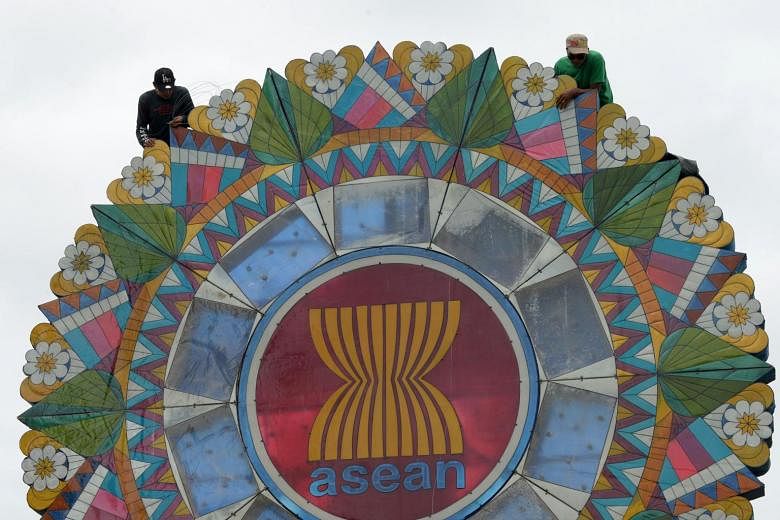SEOUL - In what is deemed as eagerness to deepen engagement with Southeast Asian countries on issues including North Korea's nuclear impasse, South Korea's Foreign Minister Kang Kyung Wha met 10 ambassadors from the region ahead of attending a key forum in Manila.
Pyongyang's two intercontinental ballistic missile (ICBM) tests last month is bound to dominate the Asean Regional Forum, with meetings planned between Ms Kang and her counterparts including US Secretary of State Rex Tillerson, China's Wang Yi, Japan's Taro Kono, and perhaps, even North Korea's Ri Yong Ho.
The 27-member ARF, which opens next Monday, is the only official multilateral platform that draws North Korean participation. Tension will be high as top diplomats trade barbs over the regime's fast-advancing missile and nuclear programmes which pose an urgent threat to global security.
On her part, Ms Kang is expected to seek Asean's support for new South Korean President Moon Jae In's dual-track North Korean policy of pursuing pressure and dialogue in tandem, with rapprochement as the end goal.
Scholars specialising in Southeast Asia have also urged Seoul to do more to tap Asean's friendly ties with both Koreas to resolve North Korea's nuclear crisis.
Pyongyang has refused to return to negotiations to end its nuclear programme, demanding instead recognition as a nuclear state as it accelerates tests to develop a nuclear-tipped ICBM capable of striking major US cities.
Asean can "play a bridging role" between the two Koreas and between North Korea and the US, Professor Shin Jae Hyeok from Korea University told The Straits Times.
"For example, Asean could persuade North Korea to have a meeting with South Korea in Singapore, or any Asean state," he said.
Yonsei University professor Kim Hyung Jong suggested an Asean+2 dialogue partnership that includes the two Koreas. He sees Asean as a broker that can promote dialogue with North Korea, which has cut off communication channels with the South.
Ms Kang's Tuesday meeting with Asean ambassadors in Seoul, in which they discussed diplomacy and cooperation, is a sign that she is "very keen to get support from Asean dealing with North Korea", added Professor Kim.
South Korea's two previous conservative governments used to exert pressure on ARF to toughen its stance against North Korea, or even cut ties. But the liberal Moon administration is expected to adopt a softer stance leaning more towards dialogue.
Dr Lee Jae Hyon from the Asan Institute for Policy Studies think-tank said the current government views North Korea "more positively", but warned that Ms Kang will not have an easy time pushing for dialogue given Pyongyang's recent provocations.
The North has also snubbed offers of dialogue, sports collaboration and humanitarian exchanges from its southern neighbour.
But Pyongyang still seems to consider Asean as an important partner and a means of reaching out to the international community, said Mr Kim Young Sun, secretary-general of the inter-governmental organisation Asean-Korea Centre.
North Korea maintains embassies in eight Asean nations, except Brunei and the Philippines. Five Asean member states - Indonesia, Malaysia, Vietnam, Laos and Cambodia - have missions in Pyongyang.
Pyongyang also relies on Asean to drive its economy, engaging in bilateral trade with Thailand (US$50 million, or S$68 million, in 2015), Singapore (US$29 million) and Indonesia (US$4 million), amongst other countries.
Mr Kim said: "It is important for Asean to make a strong and clear message to North Korea's provocations and at the same time persuade North Korea to become a responsible member of the international community."
However, some analysts pointed out that there is a limit to what Asean can do, as Pyongyang only wants to deal directly with Washington.
Even though the ARF presents an opportunity for a US-North Korea summit, US officials said there are "no plans" for Mr Tillerson to meet his North Korean counterpart Mr Ri in Manila.
Instead, Washington is exerting pressure on Asean nations to downgrade ties and exchanges with Pyongyang in a bid to further isolate the state. The US has also urged China and Russia to do more to curb North Korea, albeit with little effect.
Mr Ong Keng Yong, executive deputy chairman of the Singapore-based S. Rajaratnam School of International Studies, said Asean would be "happy to contribute in any constructive way" to reduce tension on the Korean Peninsula.
But as there is "no serious effort" by Pyongyang to use the AFR to find ways of moving forward, he doubts there can be any resulting concrete step to de-escalate tension on the Korean Peninsula.
"Everything now rests on the DPRK (official acronym for North Korea) and the US. The problem is both do not understand each other well enough and they are not talking directly."


